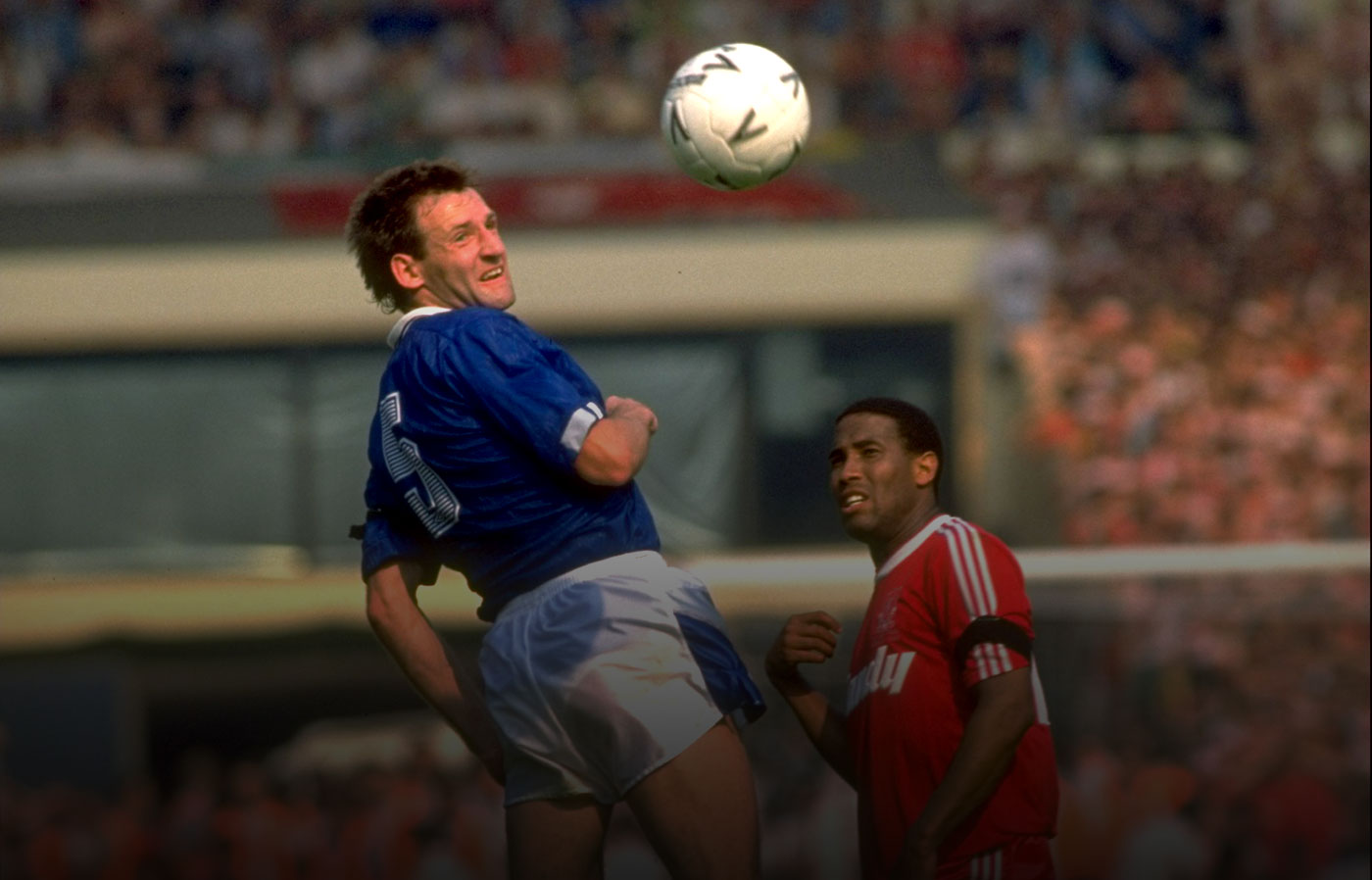"Legend" – a word frequently bandied about when describing footballers' contributions to their clubs. Here at Everton there are a few for whom the title is irrefutably apt: Dean, Labone, Sagar and Ball among them. Up there, undeniably, in those exalted ranks is a centre-half who appeared no less than 528 times for the Blues – placing him second only to Brian Labone amongst outfield players. A club record £900,000 signing in 1986, Dave Watson was a rock in the back-line from his debut, championship-winning season all the way through to his final bow in 2000. Along the way he helped steer the club through choppy waters and had the pleasure of brandishing the FA Cup before the faithful in 1995. It was a pleasure to chat with Dave about his life and times in football:
I was brought up in Boundary Street near the Dock Road. I was one of five kids – there was me, three older sisters and my younger brother, Alex. My dad used to manage the pub football team at The Cottage, which was on the Dock Road. "I'd go along from being a young kid; my dad probably took me as a way of babysitting, but while I was there I was kicking balls and growing to love football. The family were Reds; I started going to Anfield when I was 10, towards the end of the Shankly era when they were the team that was winning everything.
I was selected from our school for the Liverpool Schoolboys Primary team. Once I got into the team I wasn't an outstanding player, I was substitute quite a lot. I was very slight back then so I was played at right-back. A little later on I had my growth spurt and became a bit of a size – my dad was 6'2" – and I got put into central defence and stayed there for the rest of my career. I progressed to the Liverpool Schoolboys and played in the English Trophy competition at U15s level.
Quite a lot of the other schoolboys were signed for Liverpool and Everton – I was one of the latter ones to join Liverpool when, towards the end of my school days, I was offered an apprenticeship. Bob Paisley was there with Joe Fagan, Ronnie Moran and Roy Evans. John Benson and Tom Saunders looked after the younger lads. I first played in the B team and then progressed quite quickly into the A team and reserves – I was playing reserve team football at 16/17 which was quite a young age. I played just a few games for Liverpool reserves – the progression seemed really quick, perhaps due to my growth spurt. We played Aston Villa away and Ken Brown, the Norwich manager, came to watch me and Colin Irwin. I must have done alright that night as he came in and bought me.
There was no reluctance from me as I was quite a realistic person and my pathway at Liverpool was going to be so difficult with the quality of their defenders. At the time they had Hansen, Thompson, Avi Cohen and Alex Cribley – it would have taken me years to break through, if it ever happened at all. I saw it as an opportunity if I went to Norwich as I'd get more chances there than at Liverpool – it might have been seen as taking a step back to move forwards.
It was great at Norwich – totally different for me going to a place that was a lot more relaxed compared to Liverpool. Norwich is a bit of a sleepy city – everything was so calm and relaxed and I just seemed to fit into that nice way of life which I had not experienced before. The coastlines were fantastic, the city was immaculate and, first and foremost, the people were fantastic towards me. It really stood me in good stead that I was in digs and had to fend for myself. I grew up a bit as I had everything done for me at home and learned to do things for myself.
Joe Royle was there – we played in the same team and Joe used to give me a lift home as he had a big Jag and I was only a kid with no car. I used to jump in with Joe and go back to Liverpool with him for the weekend and then get brought back on Sunday night. Willie Donachie was also about and we eventually tied up again at Everton and, more recently, at Newcastle. Joe was a great character – he's always had that. It's what we needed – a couple of experienced players to lift the squad because we had a really young group. Coming into the dressing room Joe was like a god. The fans loved him and the players loved him too – he was just an infectious person and really lifted the whole team. It was good to meet a true legend from an early age and see how professional he was – he was a great trainer when his knees weren't playing up – and it rubbed off on the kids.
His professionalism was a great influence on me. Like Joe, I looked after myself as I got older." I was no angel – I did go for a drink with the lads or my wife on a Saturday night and had a few pints, but I'd make up for it on the training ground. You manage your body – at the age of 37 I could not do physically what some of the younger lads were doing but I had that experience to get ready for games by doing my own thing. I used to join in training early on in the week but as it got towards the game I'd sometimes have a lighter day or do my own thing - you have to listen to your body.
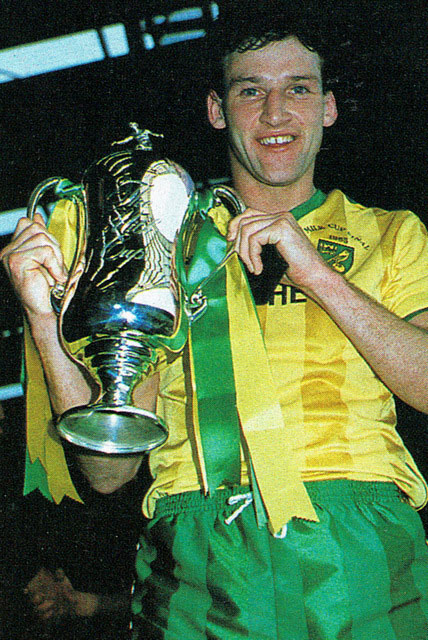
I didn't notice a great difference between playing Central League and First Division football (equivalent to The Premier League now) – I didn't worry about who I was coming up against as I had a better standard of player alongside me and they accommodated me. When I first arrived there was a lad called Duncan Forbes who played alongside me at centre-half in the reserves for a few games. Duncan was a great captain at Norwich over the years and was a legend there. He was in his late 30s and had been there for many years. When I played alongside him he just used to call me "Watson". He used to shout at me: "WATSON DO THIS!" or "WATSON DO THAT!" It was great to have someone so dominating alongside me but he used to frighten the life out of me. Looking back it was exactly what I needed, I had captain qualities anyway and this gave me a lot of strength. I took it on board and I learnt how much someone can get out of you just by talking, communicating and praising.
At the end of that season Norwich got relegated and it was rumoured that I was moving, but I had only just got there and had done well after going straight into the first team. Norwich were never quite good enough to maintain top-flight status but there was no great desire from me to move on. I knew that I needed more experience and I didn't want to be seen to be jumping off a sinking ship.
We came straight back up but were then relegated again in '85, after winning the Milk Cup – then, again, we bounced straight back in '86. During that period we had a mixture of youth and good experience: there was the likes of Steve Bruce, who had signed from Gillingham, and other good players like Mickey Phelan and Kevin Drinkell. Then we had good experience with Asa Hartford and Mick Channon. Mick couldn't run around too much but he had a great presence and got the best out of other players on the pitch – whilst Asa was a good professional.
Everything happened so quickly for me from younger age groups to the first team and then becoming captain, when I was about 21 or 22 years old. I was looking around the Norwich dressing room seeing the likes of Martin O'Neil and other senior players thinking, "I wonder what these senior players are thinking with this young kid as captain?" I led by example – I was always a wholehearted player who never ducked out of a tackle and I put my head in anywhere. I was a good talker throughout games, organising people, but I was not a bully in the dressing room – you treat people how you'd like to be treated yourself." If you treat people well they'll treat you well.
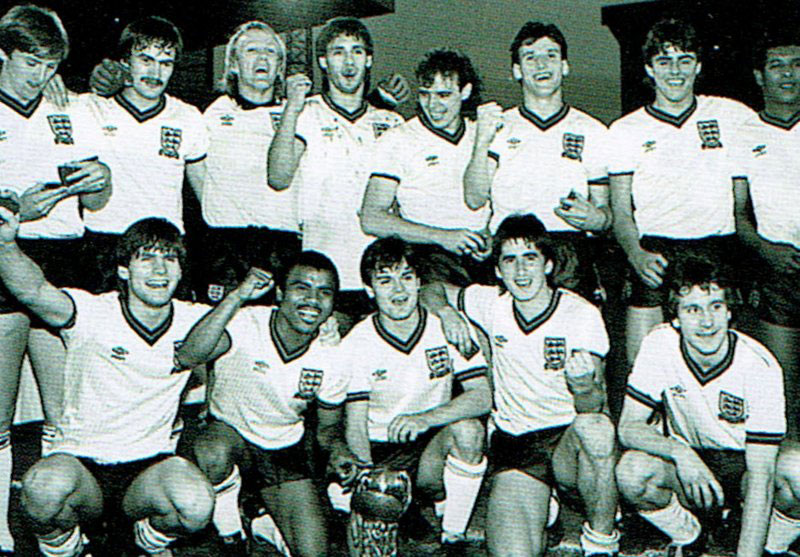
Watson experienced England U21 success with Derek Mountfield, Paul Bracewell and Gary Stevens in 1984
England won the U-21 championship when I was at Norwich – I'm the last England captain to lift that cup. Straight after the final in Sheffield, Bobby Robson took me in his car up to Scotland and I was on the bench for the senior team the next day. It was amazing – crash, bang, wallop – one thing after another. Then there was the tour of South America. I was not really expected to be playing but Graham Roberts went down ill so Bobby Robson pulled me to one side and said "Listen son, you're playing against Brazil tomorrow." It didn't come as a total surprise the way things were going, I half expected it – I wouldn't have been surprised if I scored the winner as well! I played alongside Terry Fenwick, we won the game and John Barnes scored that magical goal. At the time I was most probably organising the defence – so it wasn't until I looked back on TV that I realised what a wonderful goal it was – it will go down as one of the all time greats.
A highlight of my career was captaining Norwich in the Milk Cup Final against Sunderland at Wembley - but both teams got relegated that year. We played well that day and it was the first big trophy that I picked up; when you get a taste of that you want more. Luckily enough for me more followed at Everton. The move came a year later. I've never angled for a move or been in to see a manager and spat my dummy out. "I'm a great believer in what will be, will be.
It was the 1986/87 season and Everton had a lot of money as Gary Lineker had been sold. It was transfer deadline day and I was a last minute signing at Villa Park – there is a picture of me and Howard Kendall in front of a grandfather clock – they had opened the door and put it back a couple of hours in order to get all the paperwork done in time! It was all a mad rush and I then went straight into the thick of the action. I was coming in to strengthen the squad as Derek Mountfield was having one or two problems with his knees. But I suppose that, after spending £900,000, there was pressure on the manager to play me. Howard put me in the team but it took a bit of getting used to as it was a different system. I think everyone could see it wasn't through lack of passion – more like a lack of understanding as to how the team played. There was a high back line with lots of pace in Kevin Ratcliffe, Gary Stevens and Pat Van Den Hauwe. At first it was a bit dodgy but you keep going, keep believing, and eventually I won over the fans.
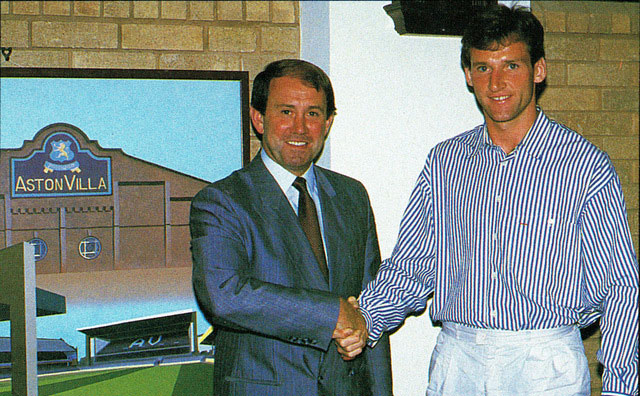
Watson signs for Everton at Villa Park in 1986
The rest, as they say, is history as I captained the club for a long time and won a couple of trophies. Everton were the team at that time – they were flying. I wasn't the quickest but I had Kevin Ratcliffe alongside me who was a great captain for the club. He had a great understanding for the game and he'd look after his teammates – if he saw someone get the better of a teammate he'd stick his foot in. But he was clever – he'd help the opponent up and shake his hand and get away with bookings as he was the captain. He was an expert in the dark arts – he should have opened schools in how to tackle someone and get away without a booking!
Big Nev was a fantastic goalkeeper and a winner. He was very vocal at the back with some words we can't print, but it was done to get the best out of every player. Nev was a great trainer too and character around the place, he is a true blue legend.
Your Number One and Number Two at a club have to be different characters. Howard would do his bit on the training ground when he felt it was needed but, as Number Two, Colin Harvey had a massive part to play at Everton." You have your "nice guy" and "bad guy" and Colin was the "bad guy" as the coach was expected to be hard and tough on the players. "Colin was great on discipline and organisation, and there was tremendous respect for him from all of the players as he was a whole-hearted player himself. He wanted everyone to give their best every day and he found it difficult to accept when people couldn't do that – 'this kept players on their toes and striving to be better.
Howard was a great man manager – he was tough with players but he knew how to put his arm" around you and get the best out of you. He didn't like getting beat but he knew how to get players up again. He'd catch you unawares – you'd come in on a Monday after a defeat on the Saturday and he'd take you all out for a bite to eat and a drink. That got everyone back together. He'd been a great player himself and he knew what made him tick so he tried it. It was still the drinking culture era so everyone enjoyed socialising and having a few pints – so when you went out on the pitch together you really battled as much as you could for your team mates.
Howard also had great football knowledge and an eye for a player – who else would have bought Peter Reid and Andy Gray after looking at their injury records? But what an influence they had at Everton both on and off the field. In my first season there were really important signings – little touches of genius by the manager to keep the team going. The likes of Paul Power came in" – who had great experience and character in the dressing room. Later there was Wayne Clarke who scored that goal away at Highbury, which virtually assured us of the title that season. We had a really good team spirit – the mentality was that we were always going to win games. We finally clinched the title at my old club, Norwich City – it's amazing how these things happen.
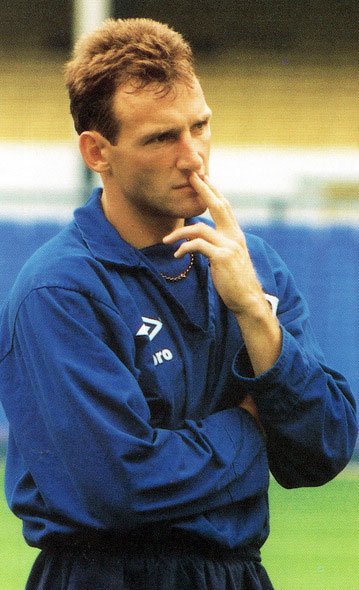
Howard was a big favourite with everyone: the fans and the players, but he then had the chance of a lifetime to get out to Bilbao and give it a go there – especially as we were banned in Europe. Colin took over the manager's job. We've seen so much in football where the Number Two becomes a Number One with varying degrees of success. I'm not saying it can't work, but one day as a coach you"re battering the players to get the best out of them and the next you"re the manager and supposed to be putting your arms around them – it's a tricky one. Then one or two players left and it became a rebuilding job for Colin and the new type of players came in like Tony Cottee, Pat Nevin, Stuart McCall and Neil McDonald. It was a big change – going from really strong characters in the group to new players with their own character and it took a bit of getting used to each other. In the meantime Liverpool were flying – signing" Beardsley, Barnes and Aldridge; it's like Chelsea going out and buying Diego Costa and two other world-class players now. Those signings won Liverpool the league – they scored goals and were creative players.
For me football goes out of the window when something like the Hillsborough disaster happens. It was tragic for everyone concerned. We were on the way back from our semi-final against Norwich, Liverpool fans coaches were driving past us and news was filtering through over the radio. It shook everyone in the Everton camp and it was a horrible time – everyone seemed to know someone who had lost someone. In the Final, if Everton had won it, I could not have imagined Kevin, myself, or any of the players running around Wembley stadium celebrating. After such a tragic event it just wouldn't have been right, Liverpool winning it may have been the best thing.
When Howard came back as manager he hadn't changed much but financially we weren't in the market for the top players. The type we were buying were average and we were becoming an average team. Back then as a manager with a small squad, if you were given "2 million to spend did you buy two really good players for "1 million each or four for "500,000? Howard had that dilemma - there wasn't the money available to get the quality we needed so maybe we had a big squad in case we ran out of players towards the end of the season."
After Howard left there were difficult times under Mike Walker. He'd had a "fast-forward" career, having been at Colchester and then youth coach at Norwich. When he took over as Norwich manager many of his former youth players were in the first team so he got a great response from them and did well. They did well in Europe so he was a sought after manager – you can see why Everton brought him in. However it's tough for managers coming into a strong group and I think Mike found it a bit difficult managing one or two of the characters – Everton was full of them. Obviously things didn't turn out – Mike wanted to play what Roberto Martinez likes to play now – getting the ball down and playing and passing it. He had all these ideas but we didn't have the players that could do that." We conceded goals and then our backs were against the wall, it was a really tough time for everyone concerned leading up to the Wimbledon game at the end of the season." It did weigh on my mind "" you don't want relegation as captain on your CV." A lad sent me a card saying "Good luck – I hope that you have more luck than the captain of the Titanic" – there was always a good bit of humour about!
On the day of the match Mike was a little bit quiet – he talked about things but it needed one or two players to liven things up. This wasn't a game that was about tactics – what it needed was eleven strong men on the pitch and we got that. After coming back from two goals down it showed the character that people had in them, but they hadn't shown it enough before. When you need to do something – not just want it" you find that extra edge and do it." Everton on the pitch that day needed to win the game – but it was a close one.
When Mike left I was hoping that Joe Royle would get the job. I knew him of course from my Norwich days." He was another legend coming back to the club and he had the character that we wanted, the club was screaming out for his personality. There was great partnership with Joe and Willie Donachie. Joe had the character and relaxed personality whist Willie was on top of the players like Colin Harvey had been as coach." It worked well and the players respected both Joe and Willie." Willie had played for his country and he was as honest as they come – he'd tell you straight and everyone knew where they were. If he thought your standards had dropped he'd tell you." The fans loved Joe's personality and the fans got behind us and things turned around. We went out and won that first game against Liverpool and we were then on a roll.
Andy Hinchcliffe would just put the ball on Duncan Ferguson's head and he'd score. Andy got into the England team because of his set play delivery – he had great quality. Duncan did a great job for the team, he was strong physically and had great ability." When he was on top form he was unplayable and he was a fantastic character around the place."" He has a great presence around people and you'd rather have him in the team than playing against you. It was a bit of a shock to me recently when he became a coach at Everton as he'd spent a few years in Spain, out of football," and I wasn't sure if he'd come back. But he obviously has a great love of the game and he has shown it by the work that he's put in to get where he is now, working with the young kids and doing all his coaching badges." I'm sure he"ll go on and do well for himself.
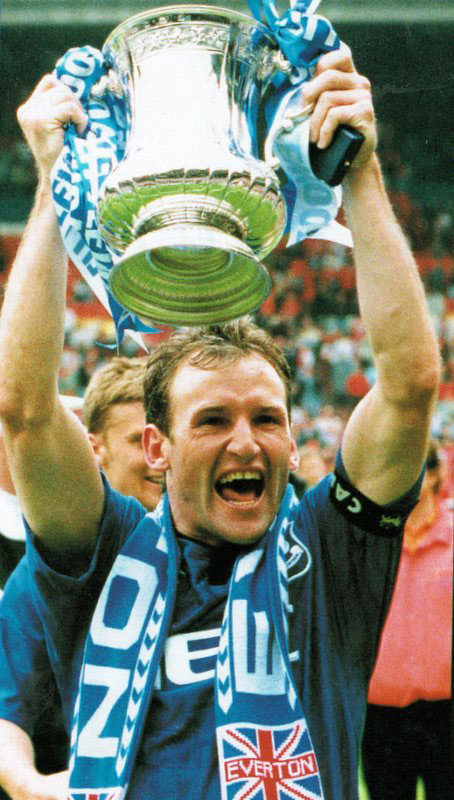
For me winning the league title was the "big one" but the next best thing for me was the FA Cup win – it was unbelievable. I don't agree with clubs that don't go for it because there's not much money involved. It's totally disrespecting what it gives to the fans. It's the chance of a lifetime to go and see your team at Wembley – people remember it for the rest of their lives. I can see where clubs are coming from about the lack of money, risk of injuries and the risk of going out of the Premier League." But believe me, the buzz that it gives players and supporters is unbelievable – you"ve got those memories and, if you"re a player, the medal. It was 20 years ago now but when people stop me in the street it's as if the Cup Final was last week." It shouldn't be like that - it's tough on the supporters when they know they"re not going to get success yet they"re expected to carry on supporting their team.
The semi-final against Tottenham was the best match. It was billed as being a Tottenham versus Manchester United final and we spoilt it! "In the final Paul Rideout got the winner, he was a good all-round player and did a great job. He could do the chasing about and drop into the Number 10 role. He held the ball up and was as brave as anything heading the ball in dangerous situations." My defensive partner, Dave Unsworth, had great potential from a young age. The power and sheer build of him with aggression – all the signs were that he would go on to become a great player. He did go on to be a very good player for Everton.
The next season we got Kanchelskis and he was unbelievable. Right foot, left foot, pace, a tough player and one of the best I have played with. You just put him on the pitch and gave him the ball – he was a real forward thinking player.
Then I really don't know what happened – we'd gone from Cup winners and hoped to be building on that, to slipping down the table." I had a phone call off Peter Johnson saying that with Joe leaving he'd like me to take over for the remaining games of the season. I have never shirked anything and I just said, off the cuff, that I'd love to: "Of course, no problem." It's only when I put the phone down I thought: "Bloody hell – what if we get relegated?" So I was playing, managing and coaching, how the hell do you get on with that and stay up?
The departure was tough on Joe – everyone loved him at the club. The day he left, Joe got us all into the gym to say his goodbyes. He said "Listen, I'd just like to thank you for a wonderful couple of years. We've won the Cup and finished 6th in the league. I hope that you give Waggy the same support as you gave me...or maybe not as you'd get him the f***ing sack as well!" Everyone just burst out laughing and Joe had a smile on his face. It's great when, in tough times, people keep their sense of humour.
I took over for the remainder of the games and we got enough points to stay up." We had Tottenham, Arsenal, Liverpool, Villa, West Ham and Sunderland – some really tough fixtures but we did enough. I didn't even think about being made permanent as manager. I never chased anything in my life and this time it didn't happen. Then Howard came back, he was the fella they knew and maybe they thought he could steady the ship without them having to pay millions for another manager. Howard was the easy option but it was a difficult time as there was no money about. He bought people like John Oster and Gareth Farrelly but if you need results you don't buy potential – you buy proven players.
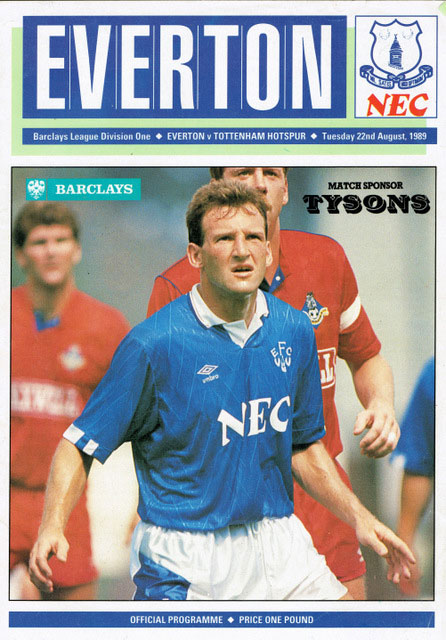
Dave Watson programme cover, August 1989
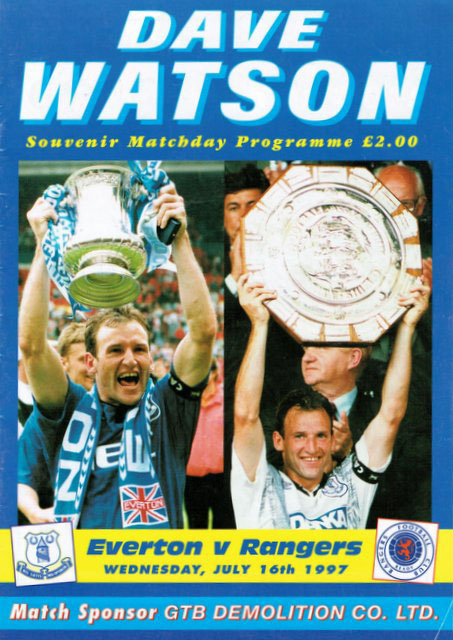
Dave's testimonial programme cover, 1997
Walter Smith came in after that and made some big signings. Marco Materazzi was 6'3", with a great left foot. I couldn't see that he was going to win the World Cup but you knew he had potential to become a "player". Olivier Dacourt also went on to prove that he was a great player. John Collins came in and Back of The Echo (Ibrahima Bakayoko) who was a proven goalscorer over in France. The problem was that we weren't equipped to bring in foreign players without the first-hand experience of dealing with different cultures. We know about that now and there's lots of planning for what we do with the players and making sure they, and their families, settle. Back then you were signed and were expected to play footie for us on the Saturday."
I was surprised when Everton signed Richard Gough as our aggregate age was 74 and the News of the World had a photo of us with walking sticks the day before we played Manchester United! Goughy was a great pro – that's how he played as long as he did – and he was the type of player needed: a leader and strong character for the younger players.
I finished playing in 2000 although I remained as a player-coach." This put me in touching distance of Brian Labone's appearance record, I had so much respect for Brian. There were times when I was on the subs bench and offered the chance to go on for the last five minutes to get an extra appearance." But I didn't want to be coming on for 5 minutes here and there – just to beat his record. If there was a crisis I would have gone on and done my best, but I knew my time was up as it was becoming tough to get through games. I was working with Archie Knox and Walter – they were good people and we stay in touch. Archie would take me for a five hour drive just to see a reserve game in London.
Then I went to Tranmere as manager. We did okay but we failed to get into the play-offs and everything had been geared to promotion, so I got the boot. After a short break out of football I went to Wigan with Steve Bruce. When Roberto Martinez became manager I was working with the Under 18s. I could see Roberto getting a chance of a top club. He is a great lover of the game with fantastic knowledge." Deep down the fans do appreciate what he's trying to do as they love the game played in the right way.
I ended up in the North East when Willie Donachie called to say that there was a job going with Newcastle Under-18s as coach. I put in my CV and got the job so I've been up here for three and a half-years and I'm loving it up here." I go back home to Merseyside to visit the family but don't get to Goodison much as Saturdays are a busy time. Was there ever a chance of going back to work at Everton? It hasn't happened yet obviously, but remember: "what will be will be!"

